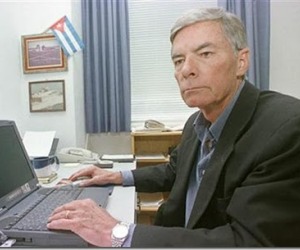
- Cubadebate -
http://www.cubadebate.cu -
.
Cubadebate, Contra el Terrorismo
Mediático
http://www.cubadebate.cu

- Cubadebate -
http://www.cubadebate.cu -
Philip Agee, el agente CIA que espió a Ecuador y lo contó todo
Publicado el 26 junio 2013 en Jean-Guy Allard,Opinión,Política
 Tuvo
el valor, en 1967, de abandonar una agencia que se
caracterizaba por su apoyo criminal a dictaduras
sanguinarias. Contaba que tomó esa decisión de manera
definitiva cuando, estando en un restaurante de
México,
vio a una amiga estallar en lágrimas al conocer la noticia
de la muerte del
Che.
Tuvo
el valor, en 1967, de abandonar una agencia que se
caracterizaba por su apoyo criminal a dictaduras
sanguinarias. Contaba que tomó esa decisión de manera
definitiva cuando, estando en un restaurante de
México,
vio a una amiga estallar en lágrimas al conocer la noticia
de la muerte del
Che.Ahí está representada, en una sola imagen, toda la nobleza del personaje que falleció a los 73 años de edad, el 7 de enero en 2008, en La Habana, en esta tierra de Cuba desde donde seguía denunciando las actividades terroristas y subversivas desarrolladas por los servicios de inteligencia de los Estados Unidos contra gobiernos y líderes progresistas del continente.
Phillip B. Agee, ciudadano estadounidense, fue oficial de la Agencia Central de Inteligencia (CIA) en América Latina durante doce años hasta que abandonó sus filas en 1969 por motivos de conciencia. Ocupaba entonces un puesto de fachada en la embajada norteamericana de México, como agregado olímpico, con el pretexto de la preparación de los Juegos de 1968. Anteriormente, había sido ubicado en Ecuador y en Uruguay.
”Millones de personas en el mundo entero han sido matadas o, por lo menos, han visto sus vidas destruidas por la CIA y las instituciones que soporta”, declaró Agee en una entrevista concedida en 1975.
”Yo no podía quedarme sentando, haciendo nada”, añadió.
Al salir de la Compañía, mientras sufría amenazas y una constante persecución que puso su vida en peligro en más de una oportunidad, se dedicaba a redactar su libro “Inside the Company: CIA Diary” ( Dentro de la Compañía: Diario de la CIA).
La obra, verdadera síntesis de las actividades criminales de la CIA en América, fue publicada en 1974, acompañada de un anexo con 22 páginas de nombres de agentes infiltrados en todo el continente. Constituyó una verdadera bomba que estremeció a todos los sectores de los servicios norteamericanos de inteligencia.
Determinada a eliminarlo, la CIA encargo al ex jefe de la estación CIA de Miami, Ted Shackley, conocido como el Fantasma Rubio, la misión de capturarlo. Agee tuvo que salir de Francia donde se encontraba para refugiarse en Cambridge, Gran Bretaña, Agee fue entonces expulsado por los británicos a solicitud de Washington.
Impedido de radicarse, sucesivamente, en Italia y en los Países Bajos, donde las autoridades fueron constantemente presionadas para negarle algún estatuto migratorio, privado de pasaporte norteamericano por ser una “amenaza a la seguridad nacional”, se exiló en 1980 en la isla caribeña de Granada, bajo el gobierno revolucionario de Maurice Bishop.
Con la invasión estadunidense contra ese pequeño país, en 1983, se refugió en Nicaragua, para luego de la llegada al poder de la contrarrevolución sostenida por Washington, instalarse en Cuba que le ofreció su hospitalidad.
A pesar de todos los peligros y dificultades, Agee publicó Trabajo sucio: la CIA en Europa occidental, con Louis Wolf y varios artículos de prensa además de conceder entrevistas y asistir a reporteros en búsqueda de información.
En cinco oportunidades, el gobierno estadounidense intento llevarlo a juicio por la revelación de secretos, pero sin éxito, sus ex jefes temiendo, en última instancia, el uso que pudiera hacerse de la enorme cantidad de informaciones que conservaba.
Rabioso, George Bush padre, el ex jefe de la CIA reciclado en presidente que apadrinó la fundación de la CORU terrorista anticubana y la operación Condor, lo calificó de traidor y lo calumnió en numerosas oportunidades. Su esposa, Barbara, fue condenada a retractarse cuando lanzó el mismo insulto por escrito, en una autobiografía redactada a cuatro manos.
Amigo fiel de Cuba, Agee demostró como la Isla se encontraba víctima de un nuevo programa mundial desarrollado por la CIA para financiar y desarrollar organizaciones llamadas disidentes bajo la fachada de la Agencia para el Desarrollo Internacional (AID) y un fondo expresamente establecido en 1983 con este objetivo, The National Endowment for Democracy (NED).
Mientras el New York Times se interrogaba, al anunciar su muerte, sobre la dimensión de los “daños” causados por Agee a los servicios de inteligencia de EE.UU., los medios progresistas del mundo reconocieron, al contrario, los servicios que rindió a la humanidad, como verdadero patriota norteamericano, al haber desenmascarado una organización que llevo hasta extremos nunca vistos el uso de la violencia por una gran potencia contemporánea.
Una potencia que protege a un terrorista como el cubanoamericano Luis Posada Carriles mientras mantiene encarcelados en condiciones infrahumanas a los antiterroristas cubanos que intentaban contrarrestar sus planes.
Cuando el mundo entero se escandaliza con las torturas infligidas en Guantánamo y en toda una red de centros de interrogatorio conformada por la CIA en el mundo entero, cuando descubre, ¿qué pensará el agente de la CIA que se sumó a la organización con la ilusión de defender a su país?
Contratado por la CIA como analista de las informaciones robadas en el mundo entero con su maquinaria infernal de ciberespionaje construida, Edward Snowden, se habrá dado cuenta, como Philip Agee, que debía renunciar a las ventajas que procura un empleo de funcionario federal norteamericano, para sumarse a la lucha de los miles de millones de seres humanos que, armados con la sola fuerza de sus convicciones, creen que un mundo mejor es posible.
URL del artículo : http://www.cubadebate.cu/opinion/2013/06/26/philip-agee-el-agente-cia-que-espio-a-ecuador-y-lo-conto-todo/
.
Cubadebate, Contra el Terrorismo
Mediático
http://www.cubadebate.cu